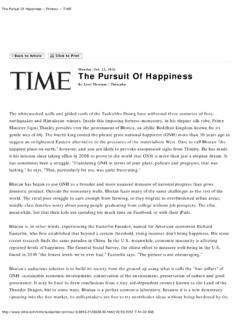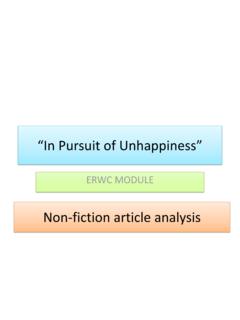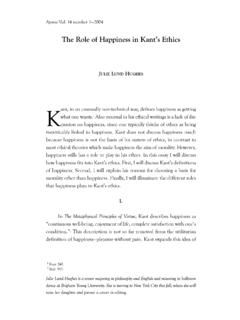Transcription of The Pursuit of Happiness - WPSA Western Political …
1 The Pursuit of Happiness Prof. Ryan Rynbrandt, Collin College Paper Prepared for the Western Political Science Association 2016 Annual Conference in San Diego, CA March 25, 2016 Abstract: Both academic and popular discussions of the Pursuit of Happiness tend to downplay its relative importance in the trinity of unalienable rights listed in the Declaration of Independence. Its inclusion is often treated as little more than a curiosity or a rhetorical flourish. Investigation of the personal and public writings of the f ounders of the United States and their intellectual forebears reveals that the founding generation held as a fundamental assumption that the primary purpose of government and the main criterion for measuring its worth was the extent to which it facilitated the Pursuit and promoted the obtainment of Happiness among its people.
2 This Founding Assumption was a natural outgrowth of the Enlightenment, and was the one idea that united the founding generation even in the midst of passionate disagreement about the proper size, scope and powers of government. The conception of Happiness held by the Founders had deep historical roots and included elements of enjoyment, fulfillment and civic virtue. A Brief History of the Pursuit of Happiness : The Founding Assumption: Virtually every American knows the phrase life, liberty and Pursuit of Happiness , and would say that these are inalienable rights integral to America s founding. Many can trace the words to Thomas Jefferson and the Declaration of Independence. But not many Americans are aware of much beyond that.
3 That is a shame, not only because it is a great story, but because it is important for understanding why the founders put their lives on the line to establish a new government and what they wanted that government to achieve. Thomas Jefferson s inclusion of the Pursuit of Happiness as one of the three specific examples of inalienable rights in the Declaration was not just a rhetorical flourish by a gifted writer who wanted to inspire his readers. Nor was it (as some have suggested) a strategic ploy to make fighting for John Locke s formulation of Life, Liberty and Property more palatable to a vast population without property for which to fight. It wasn t even unique to American thought, no matter how many people wrongly credit Jefferson with originating the phrase.
4 The idea of the Pursuit of Happiness as a natural right to be protected by government was well established and widely accepted in the United States and Europe by the time Jefferson included it in the Declaration. Public Happiness was, in fact, what the founders assumed was the entire purpose of government. It wa s a conclusion drawn at a very interesting and particular time and place, and developed as the synthesis of a rich intellectual history spanning millennia, from the ancient Greeks to the Enlightenment. The Origins of the Founding Assumption The ideas that drove the American revolutionaries did not spring newly formed from their own bewigged heads. They were, in fact, only the flowers of an intellectual growth with very deep roots perhaps as deep as human history itself.
5 The minds that formulated the Declaration of Independence and the American Constitution were fortunate to have been living at t he tail end of the Enlightenment, a time in which many hands were digging through the soil of Western history s great philosophers, scientists and theologians. And for whatever reason, what sprung from that soil was a garden of theories about and movements for the Pursuit of Happiness . The ubiquity of the Founding Assumption that governments exist to promote the Happiness of their citizens - among the American revolutionaries was actually not surprising given the times in which they lived. The Ancient Philosophers and the Pursuit of Happiness : The philosophical and Political thought of 18th century thinkers rests heavily on the foundation laid by the ancient Greeks and Romans.
6 The letters and other writings of the Founders, particularly those of Jefferson and Adams, are littered with references to them. In the ancients lie the deepest roots of the Founding Assumption. Darrin McMahon notes that one of the central objectives for Socrates, Plato and Aristotle was that of making Happiness the goal of all human activity. These three spilled a lot of ink investigation the causes, nature, attributes and limits of Happiness . And from the beginning, the ordering of society, politics and governance to maximize Happiness was part of their thought. Though its main focus was on justice, Plato s Republic was clearly a foray into Political theory about the best societal arrangement for human Happiness .
7 Socrates summed up the Founding Assumption millennia before the American revolutionaries in saying What is the point of glittering statues and city walls and warships if those within them are not happy? Though Socrates, Plato and Aristotle may be the best known, they were not alone amongst the Greek philosophers in their obsession with Happiness . The Epicureans with their philosophy of pleasure and pain , the Stoics with their philosophy of contentment, and other Athenian schools of thought jumped on board with that obsession. As McMahon puts it By the close of the fourth century BCE, Happiness eudaimonia was the undisputed goal of them all. 1 And as diverse and sometimes conflicting as those different schools of thought could be, one common thread that united Platonic, Aristotelian, Epicurean and Stoic was that Happiness is obtainable by human effort.
8 This was an ancient revolution in Greek thought: that we are not simply subject to the whims of the gods and dependent on circumstance for our Happiness , but can create it ourselves. Human agency could be called upon to improve the human 1 Happiness : A History p 51. 2 Though McMahon argues that this was new development in ancient thought, there are two main reasons to doubt this. First, though this may have been the first time leading thinkers of the day discussed it in writing, it is hard to imagine that humans were not doing things large and small in their lives to increase their Happiness before the leading academics of the time told them they could do so.
9 Secondly, he does note that his focus is on the history of Happiness in the west and it is clear that while this may have been the first time Western thinkers put such theories into writing, it was not the first time a human had done so. The idea that humans can increase their Thus when the Enlightenment thinkers were poring over ancient Greek philosophical treatises, they were mired in the west s earliest written investigations of how to develop and expand human Happiness and were presented with a variety of theories as to how people can order their lives and communities to maximize their well-being. The impact was at times direct and powerful. Thomas Jefferson, whose understanding of ancient philosophy was detailed and nuanced, wrote in a letter to William Short, As you say of yourself, I too am an Epicurean.
10 I consider the genuine (not the imputed) doctrines of Epicurus as containing every thing rational in moral philosophy which Greece and Rome have left us. But as much as he admired Epicurus, he goes on to say that even his favorite Greek was incomplete as a moralist and prescribed an important addition: Epictetus and Epicurus give laws for governing ourselves, Jesus a supplement of the duties and charities we owe to others. The establishment of the innocent and genuine character of this benevolent Moralist [Jesus], and the rescuing it from the imputation of imposture which has resulted from mis constructions of his words by his pretended votaries and artificial systems invented by ultra-Christian sects, unauthorized by a single word ever uttered by Him, is a most desirable object.












